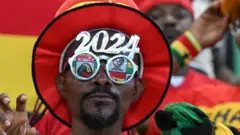
Wia dis foto come from, AFP
- Author, Brian Osweta, George Wafula & Damian Zane
- Role, BBC News
Ghana dey head for di ninth general election since multiparty politics resume in 1992 for di kontri.
For dat time, e don get three peaceful transfers of power, wit di two main parties – di National Democratic Congress (NDC) and di New Patriotic Party (NPP) – holding di presidency for a total of 16 years each.
Big issues dey ground dis time around as di NPP dey go for a third successive term in power.

Ghanaians pockets dey hit particularly hard sake of global inflation, beginning in early 2022, dat make di prices rise in di kontri at dia fastest rate for more dan two decades.
Di annual rate of increase reach a peak of 54.1% for December 2022. E don come down since, but dis na just an average and prices of some staples don continue to go up sharply.
Eggs and tomatoes, for instance dey more dan two times as expensive in February 2024 as dem be 12 months earlier. Oda Ghanaian favourites don also shoot up wit wages wey no keep up to di same pace.
Although di popular national dish – Ga kenkey (fermented maize dumplings) wit fish – neva see such a big jump, di balls of di kenkey now don dey smaller.
As a result, more pipo don dey pushed into poverty and living standards don suffer, di World Bank tok.

For 2022, Ghana default on im debt repayments and bin dey forced into long negotiations with international lenders to try and restructure di loans, wey still dey go on.
Local lenders dey forced into taking lower repayments.
President Nana Akufo-Addo admit say di kontri dey for “crisis” but blame outside forces. Di opposition and some economists say e dey down to economic mismanagement by di government.
Di amount of money wey Ghana owe creditors don steadily rise for di last two decades, but e go up sharply for 2019, and by 2022, di government need more dan 70% of income just to service di debt.

Di kontri economic difficulties dey togeda with a steadily rising unemployment rate.
Going back two decades, one in 20 Ghanaians wey dey able to work dey unemployed – dat figure now stand for one in seven.
Wit more dan half di population – some 24 million pipo – under di age of 35, young pipo dey particularly hard-hit.
Di views of younger voters fit get a big impact on di outcome of di election.

As Africa largest – and di world 10th biggest – producer of di precious metal, gold play a big role for di economy.
But wit di global gold price more dan doubling for di last decade, di attraction of getting involved for di business dey obvious.

Gold na big foreign-exchange earner for Ghana – in 2023, exports amount to $5.2bn (£4.1bn).
Along wit gold, di kontri get resources of oil, gas, diamonds, bauxite and lithium among oda tins.
Na also a big player for di global cocoa market, being di world second largest supplier of di vital ingredient of chocolate.
Dis resources don transform di economy ova di past three decades and enable di kontri to become much richer, wit extreme poverty dropping by half for dat time, World Bank sabi pipo say.

Di average annual income per person don go through a dramatic shift since 2005, wit di standard of living showing increase up to 2017.
Since den howeva, e don barely rise, except for a spike in 2021.
At election time, politicians go get to deal wit di fact say voters no dey take di long-term view but generally dey base dia choice on weda tins dey improve for di short term.

Di last three decades don see some closely fought and peaceful elections.
As a result, Ghana don often dey held up as an example of an open democracy wey don turn im back on instability and im own history of coups for a region wia issue still dey.
In some cases, elections dey on just tens of thousands of votes and despite occasional legal challenges, di results generally dey accepted by di losers.
We expect to find out di results of dis year race within three days of di 7 December election.
Ghana 2024 Election:

